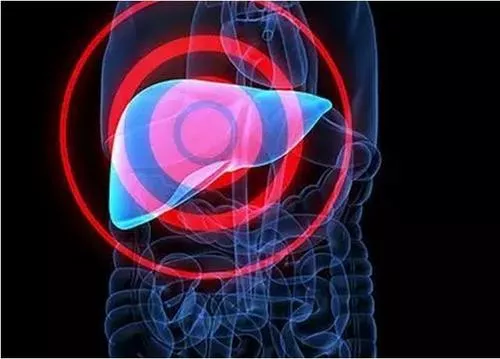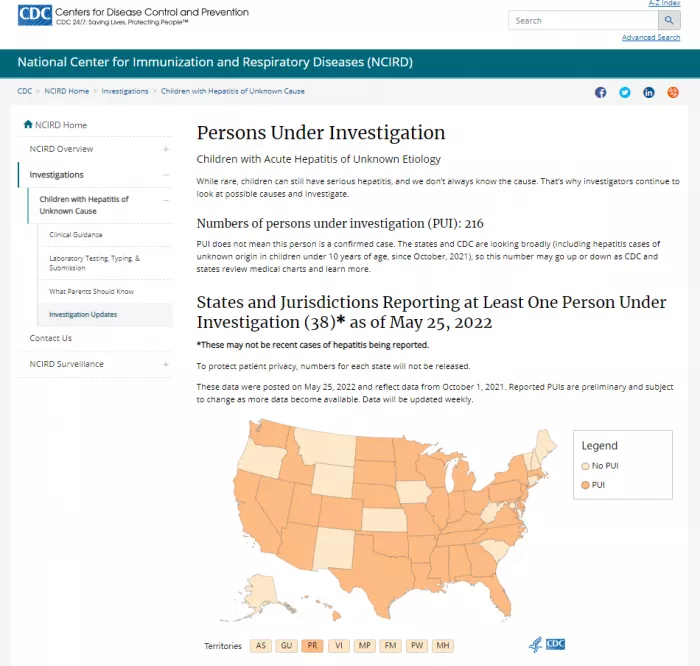According to CNET report, according to the US Centers for Disease Control and Prevention (CDC), more than 200 cases of hepatitis in children are under investigation** Most of these cases are retrospective cases, which means that as the CDC's investigation of unexplained childhood hepatitis continues, the earlier cases have only been reported now. According to the latest [update] of CDC in May( https://www.cdc.gov/ncird/investigation/hepatitis-unknown-cause/updates.html ) Five children have died of liver injury, but no other deaths have been reported since February.

Dr. Jay Butler, deputy director of CDC in charge of infectious diseases, said at the media conference in early May that although this situation is rare, children still suffer from hepatitis of unknown cause. However, the number of hepatitis cases in otherwise healthy children prompted the CDC to investigate and determine the links reported in some European countries and the United States.
Butler pointed out earlier this month that a preliminary analysis in the United States did not find a significant increase in pediatric hepatitis cases or liver transplantation. However, according to Healthline, other countries with universal medical records and better medical follow-up reported an increase in hepatitis cases among children under the age of 5.
According to the CDC, adenovirus has been detected in about half of the children and continues to be "a powerful clue". CDC is paying special attention to adenovirus type 41, which usually causes gastrointestinal symptoms in children.

"It is important to note that this is a changing situation," Butler said earlier this month. "We are casting a wide net to help broaden our understanding." He said that the CDC is reviewing these reports, which can be traced back to 2021.
Adenovirus is a common virus that can cause cold like symptoms, bronchitis, diarrhea, red eye disease and other problems. Hepatitis is an inflammation of the liver that in some cases can lead to liver failure. The role of the liver is to filter blood and help fight infection and other important functions.
As adenovirus is not known to cause hepatitis in other healthy children without low immunity, CDC requires public health departments to report all cases of hepatitis of unknown cause to local and state health departments.
What does CDC know?
Reports of childhood hepatitis are still rare in general, but CDC health officials are investigating these cases because it is unusual for other healthy children to develop severe hepatitis. The CDC is investigating reports of children under the age of 10 with hepatitis symptoms.
CDC is investigating more than 200 reports of pediatric hepatitis in 38 states and regions in the United States in the past few months. Butler said at the press conference that more than 90% of children are hospitalized, and some children need liver transplantation. The UK is investigating similar cases in children.
The initial CDC alert was based on a report involving nine children aged 1 to 6 who were treated for hepatitis in a hospital in Alabama. Some people tested positive for adenovirus type 41. Butler said adenovirus type 41 is more typical in immunocompromised patients and is not known to cause hepatitis in other healthy children. He added that the nine initial cases were not associated with covid-19 infection and that none of the affected children had been vaccinated. Most people are not even eligible for covid-19 vaccine, which is only applicable to children aged 5 and above.
Symptoms of hepatitis in children
The CDC said it asked parents and caregivers to understand the symptoms of hepatitis and contact their health care provider if they have any concerns.
According to the American Academy of Pediatrics, some symptoms of unexplained childhood hepatitis include:
-Fatigue.
-Fever.
-Nausea, vomiting or loss of appetite.
-Abdominal pain.
-Dark urine or light stool.
-Itchy skin.
-Joint pain.
-Yellow skin or eyes (jaundice).
Is there a hepatitis vaccine?
There are vaccines for hepatitis A and hepatitis B.
Hepatitis can be caused by different causes, including drug use, alcohol abuse, and even some diseases. It can also be caused by viruses; The most common types of viral hepatitis in the United States are hepatitis A, B, and C. The CDC excluded all three types of hepatitis from its published pediatric cases.
Some cases of hepatitis are acute (they do not last longer than six months), while others are chronic (they last longer than six months). According to Cleveland medical center, hepatitis C transmitted through blood contact can lead to chronic liver infection in 75% to 85% of patients.